

Rob-n-Hild Take the High Road!
Click links to jump to specific days:
Start | Nerdy
| Stranger Things
| Stairs Stairs Stairs
|
|||||||||||||||||||||||||||||||||||||||||||||||||||||||||||||||
|
Aberdeen Drive: 25.7 km. Walk: 11.2 km in 3:23 hours of which we were walking for 2:04 hours. We climbed 625 metres to a max height of 63 metres. 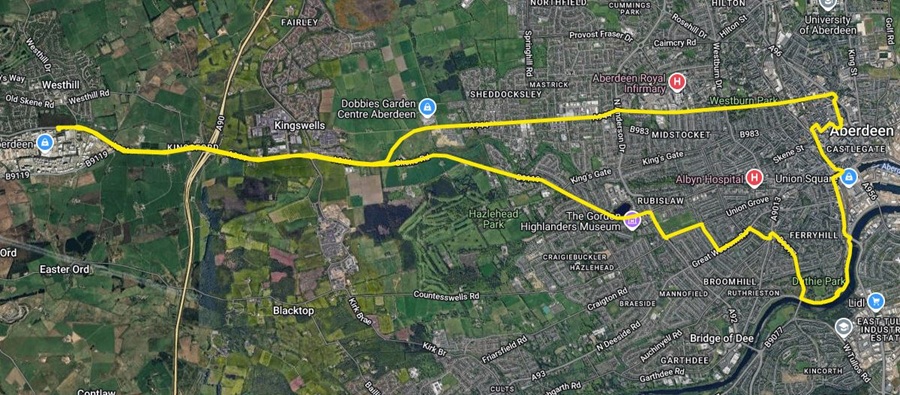
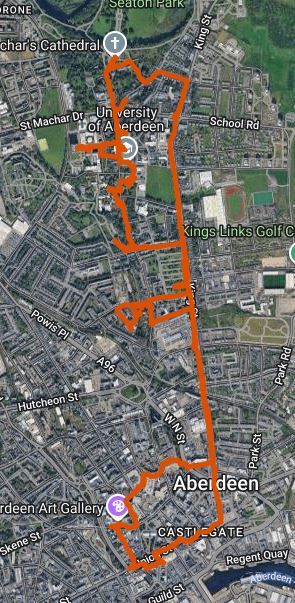
|
|||||||||||||||||||||||||||||||||||||||||||||||||||||||||||||||
|
We decided to spend half a day exploring downtown Aberdeen - before
heavy rains were to arrive. We picked Gallowgate Car Park near the bottom end of King
Street because we wanted to walk north from there and explore the old town.
Handy because we could pay with one of our existing Apps: PayByPhone.
On our way north we spotted a lot of houses having been converted to student accommodation - including this one: an old fire station. The first thing that entered Rob's mind was whether each room has a fireman's pole to the ground floor. How cool would that be! |
|||||||||||||||||||||||||||||||||||||||||||||||||||||||||||||||
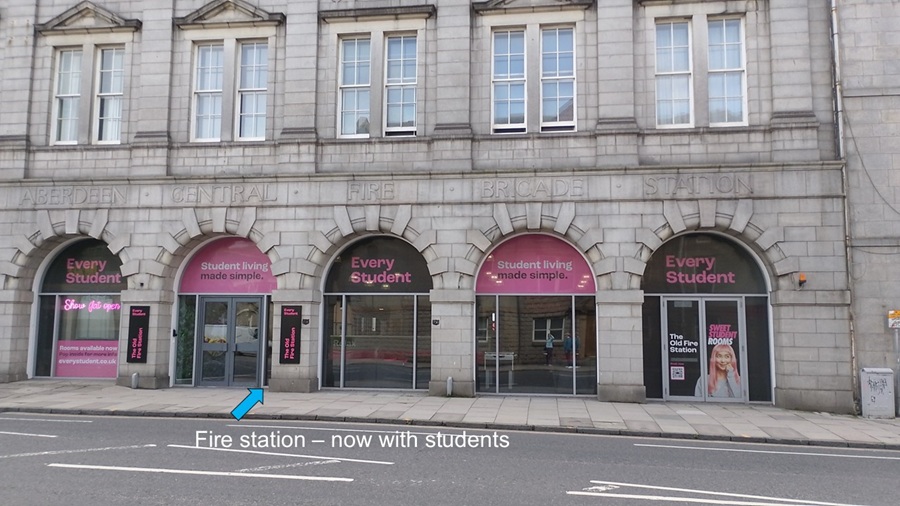
|
|||||||||||||||||||||||||||||||||||||||||||||||||||||||||||||||
| Our "Old Aberdeen Trail" brochure suggested we stop by The Chapel of St Margaret. We looked high and we looked low and could not get close to it. It seems that private houses and fences are meant to keep us tourists out. In the end we spotted something chapel-looking through the bushes - and went about our day. | |||||||||||||||||||||||||||||||||||||||||||||||||||||||||||||||
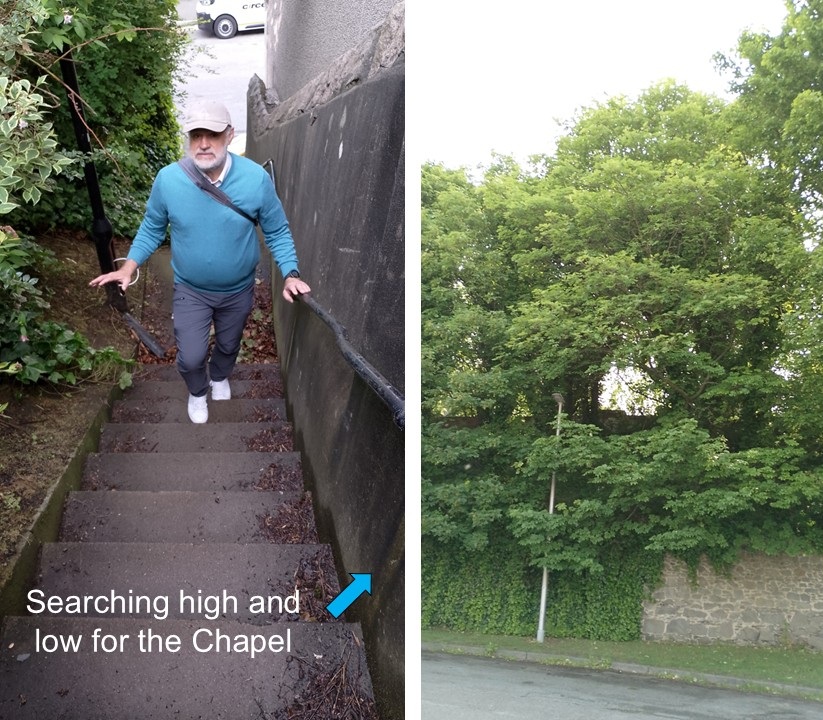
|
|||||||||||||||||||||||||||||||||||||||||||||||||||||||||||||||
| Next stop on our trail was St Peters Cemetery which used to be the site of a hospice for elderly priests around 1172. Some of the gravestones were nicer than others such as this child angel and an urn with a shroud draped over it. | |||||||||||||||||||||||||||||||||||||||||||||||||||||||||||||||
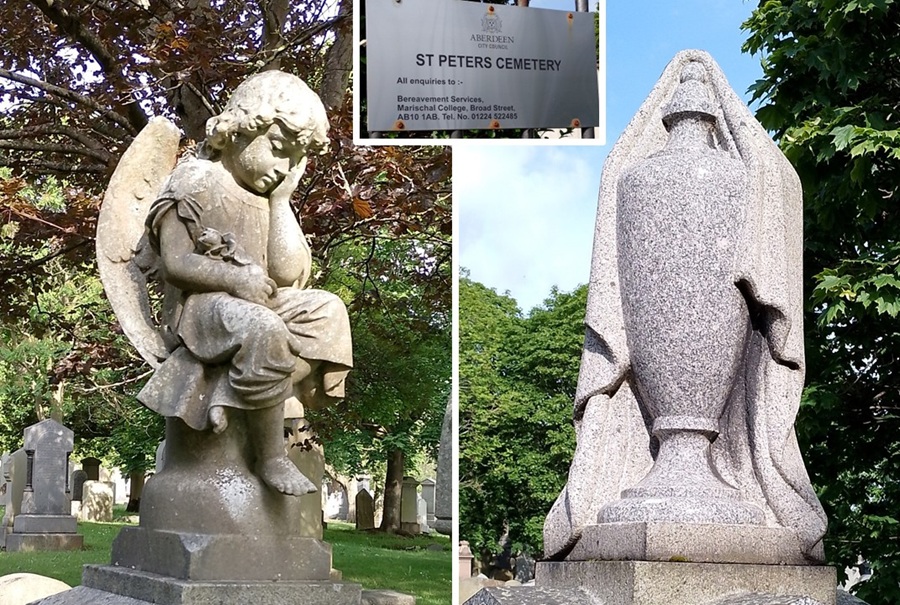
|
|||||||||||||||||||||||||||||||||||||||||||||||||||||||||||||||
| The coat of arms on the main gate has the Latin expression "Non sibi sed cunctis" which means "Not for oneself, but for all". | |||||||||||||||||||||||||||||||||||||||||||||||||||||||||||||||
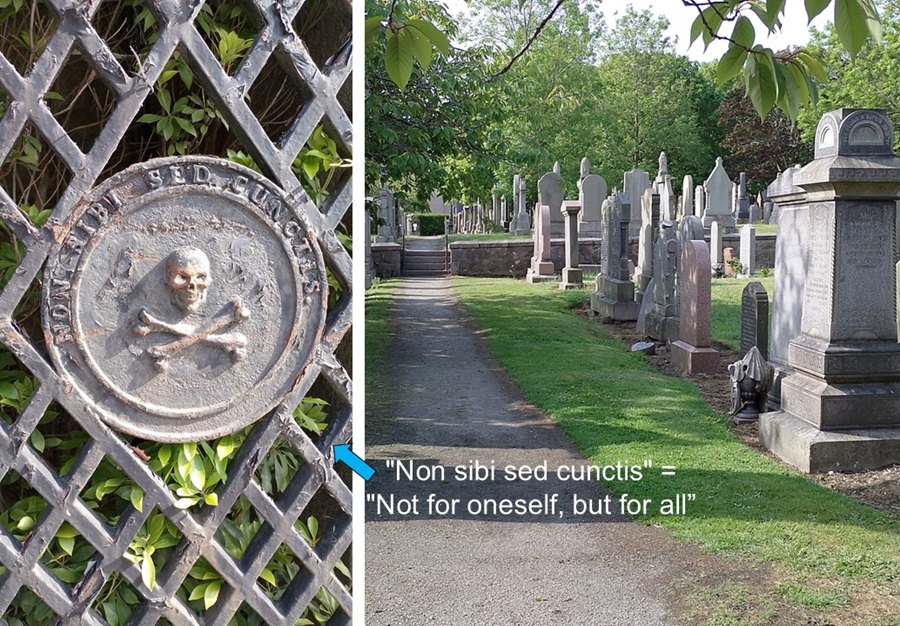
|
|||||||||||||||||||||||||||||||||||||||||||||||||||||||||||||||
| We also had to search quite a bit to find the site of the Snow Kirk. Again it is no longer visible other than a locked gate in a fence with some old graves behind it. The proper name for the church was St Mary Ad Nives (of the Snows) founded in 1498. At the time of the Protestant Reformation in 1560 they no longer used the church. They kept using the graveyard for those maintaining a Catholic faith. | |||||||||||||||||||||||||||||||||||||||||||||||||||||||||||||||
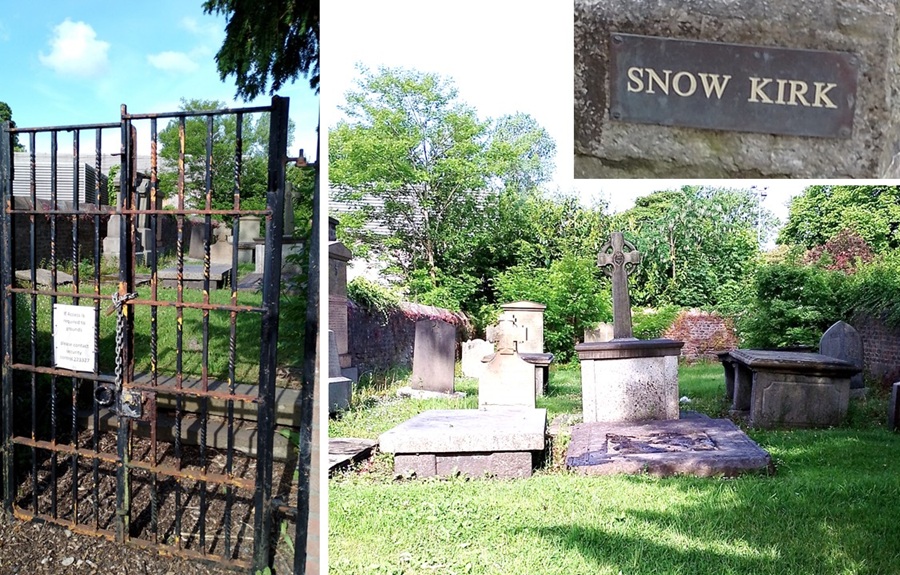
|
|||||||||||||||||||||||||||||||||||||||||||||||||||||||||||||||
| As we walked along Spital (a street), we realized that much of the Old Trail took us through the University of Aberdeen. | |||||||||||||||||||||||||||||||||||||||||||||||||||||||||||||||
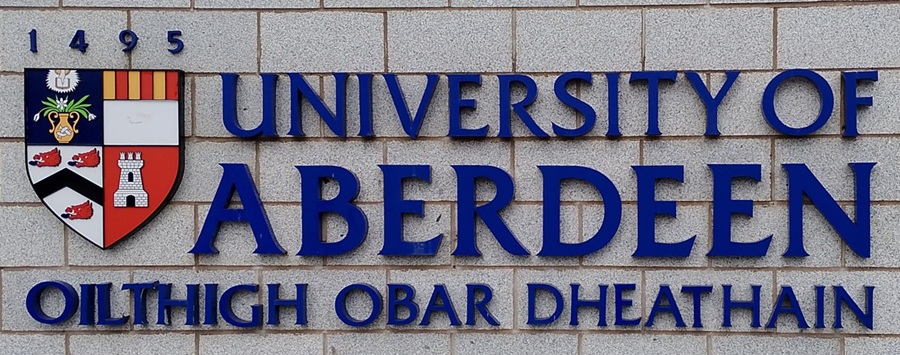
|
|||||||||||||||||||||||||||||||||||||||||||||||||||||||||||||||
| There were many beautiful old buildings including this one that with Turkish-style Minarets and all. They are the Powis Gates built in 1833. | |||||||||||||||||||||||||||||||||||||||||||||||||||||||||||||||
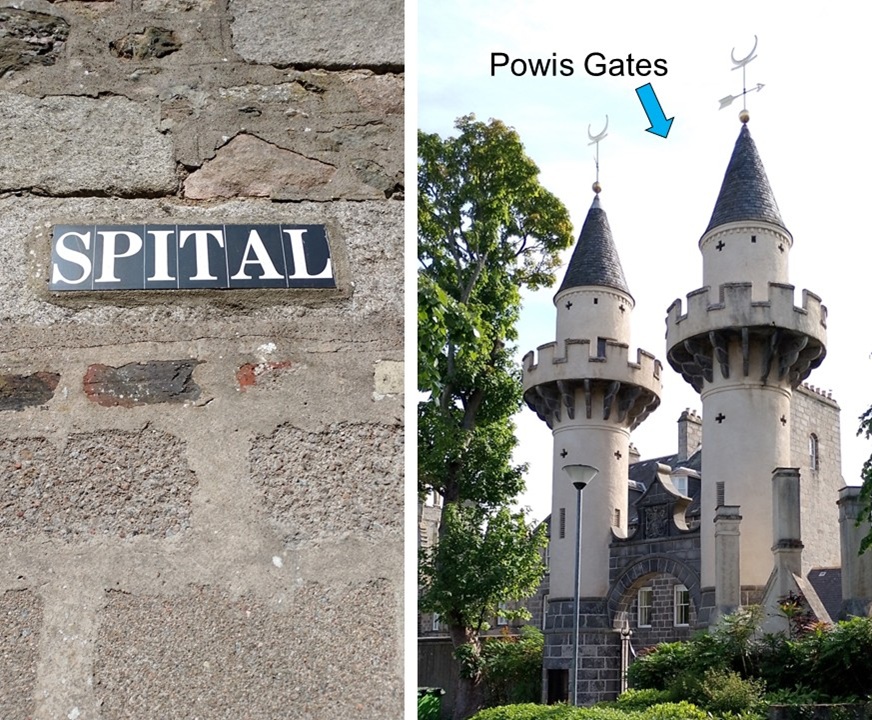
|
|||||||||||||||||||||||||||||||||||||||||||||||||||||||||||||||
| When we entered university grounds we found this King's College Chapel, which looks very grand to just be called a chapel. | |||||||||||||||||||||||||||||||||||||||||||||||||||||||||||||||
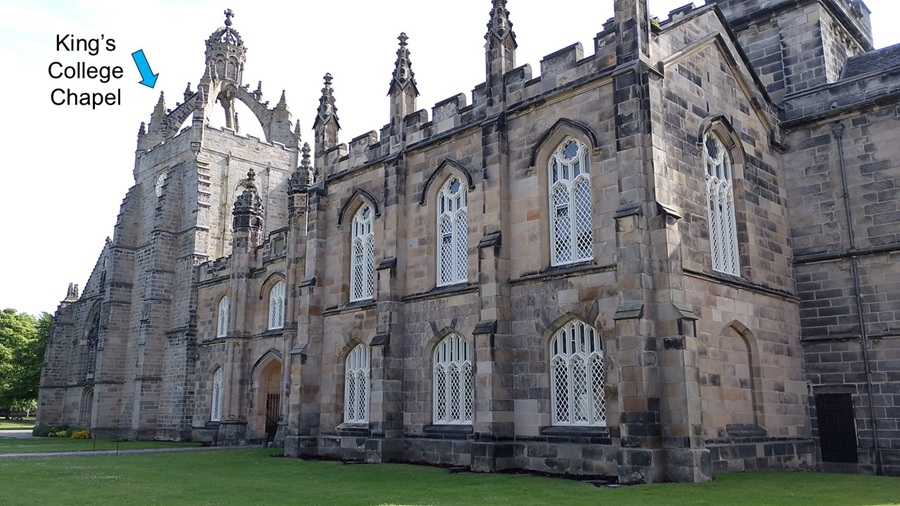
|
|||||||||||||||||||||||||||||||||||||||||||||||||||||||||||||||
|
In the courtyard next to the chapel there are several colourful crests
on the walls.
The national Latin motto of Scotland states "Nemo me impune lacessit" = "No one provokes me with impunity". Another one holds the Stewart Clan Latin motto "Virescit vulnere virtus" = "Virtue grows from a wound". More importantly, where were public toilets in the building. Good timing. |
|||||||||||||||||||||||||||||||||||||||||||||||||||||||||||||||
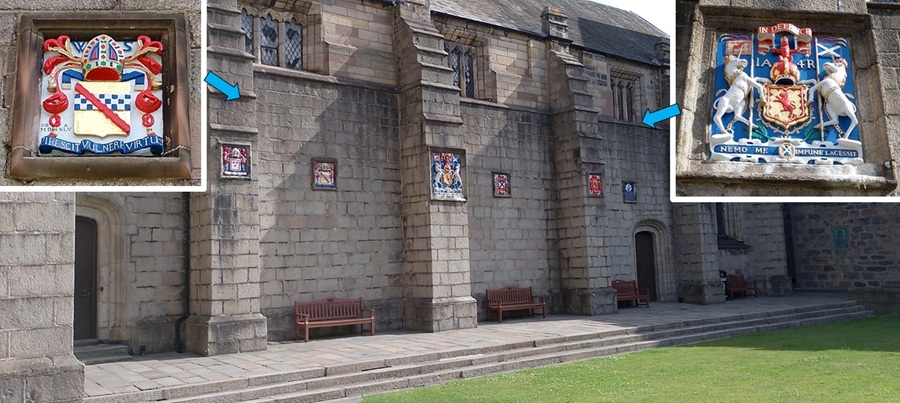
|
|||||||||||||||||||||||||||||||||||||||||||||||||||||||||||||||
| There was also an old notice listing the fines misbehaving students would face - from 2 shillings and sixpence for walking on the grass to 10 shillings if you deface buildings or furniture. In today's money that is £73 fine for carving your initials into your desk, or £18 for walking on the grass. | |||||||||||||||||||||||||||||||||||||||||||||||||||||||||||||||
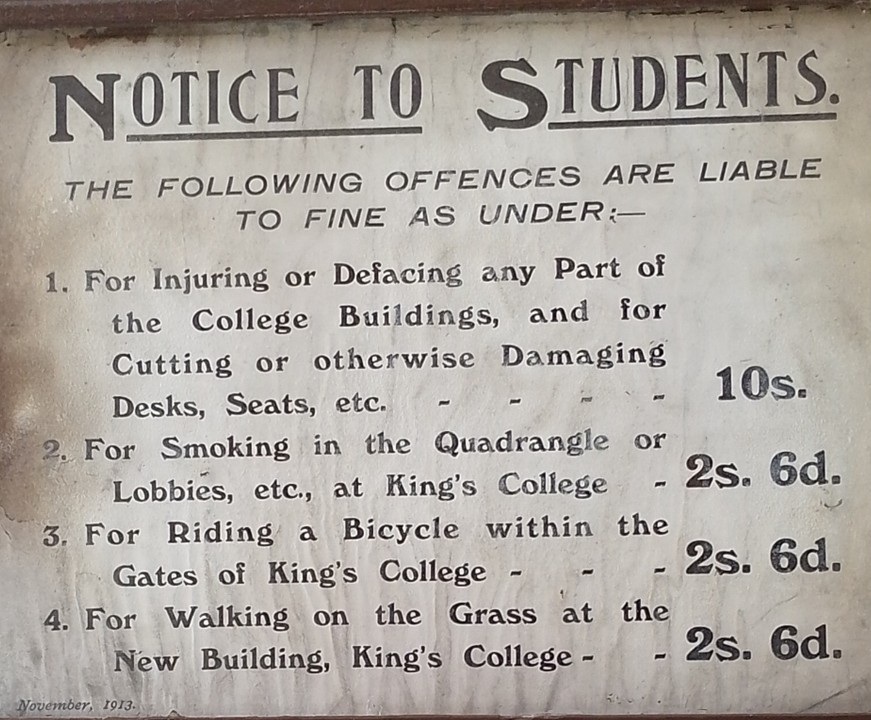
|
|||||||||||||||||||||||||||||||||||||||||||||||||||||||||||||||
|
Outside New King's building a bronze statue by Kenny Hunter born in
Edinburgh in 1962. This is meant to be a contemporary take on
intellectual awakening. Hunter questions the assumption that knowledge
is acquired through action - instead suggesting that openness and contemplation
play a part. The aim of life is not to change the world but to understand it.
Hild's comment to that view and this sculpture is that it explains the current state and decline of academia: Slackers! |
|||||||||||||||||||||||||||||||||||||||||||||||||||||||||||||||
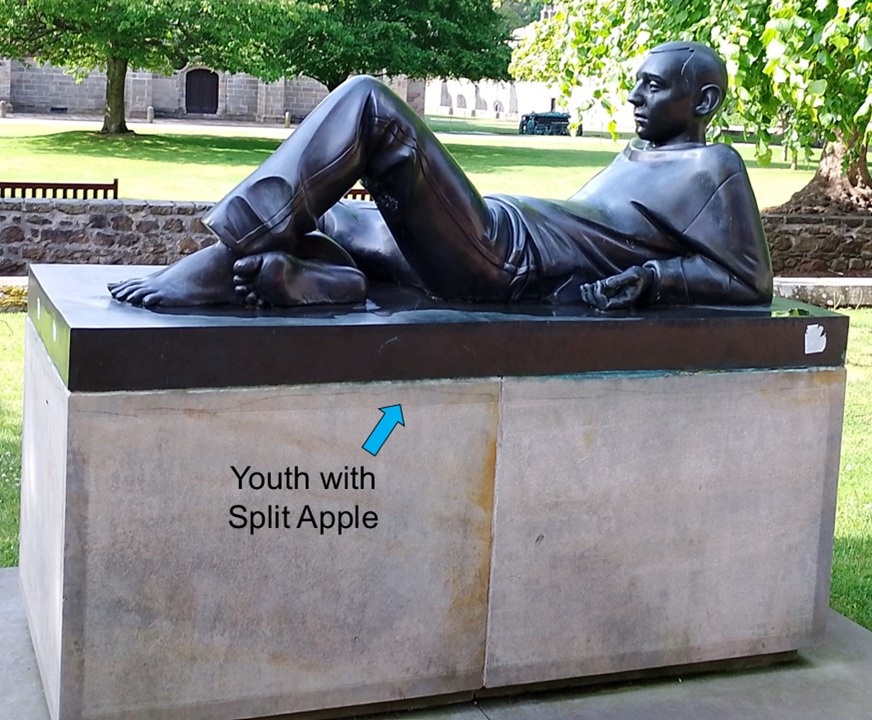
|
|||||||||||||||||||||||||||||||||||||||||||||||||||||||||||||||
| We wanted to see the Sir Duncan Rice Library. It was designed by Danish architects Schmidt Hammer Lassen and opened in 2012. | |||||||||||||||||||||||||||||||||||||||||||||||||||||||||||||||
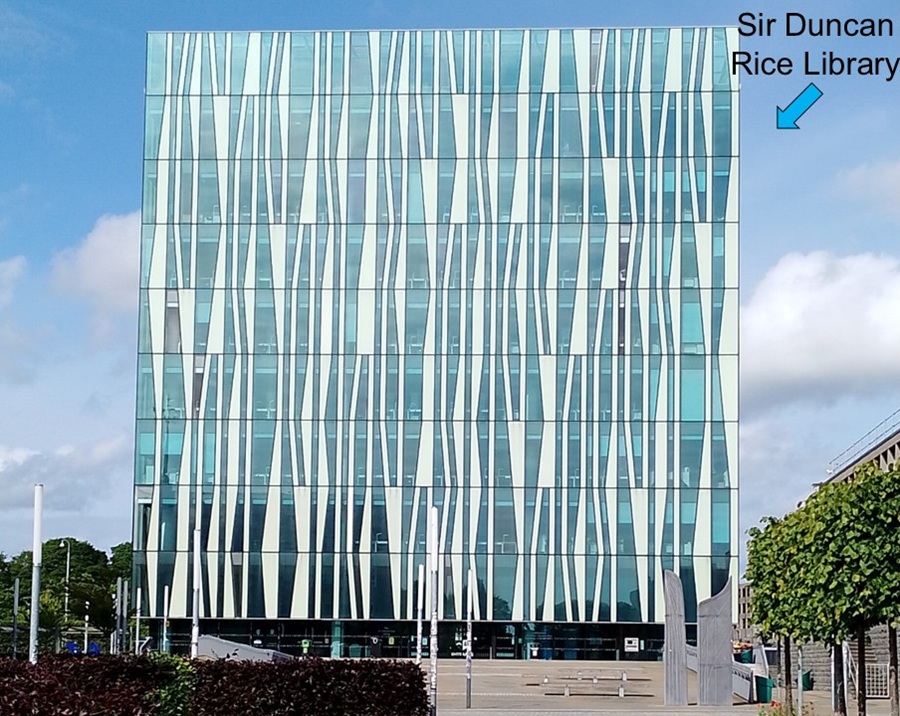
|
|||||||||||||||||||||||||||||||||||||||||||||||||||||||||||||||
| The atrium inside the library is fun to look at. Reminds us of the Guggenheim Museum in New York. The colourful umbrellas are not always there, but they made us hum the title song from "Les Parapluies de Cherbourg" song. | |||||||||||||||||||||||||||||||||||||||||||||||||||||||||||||||
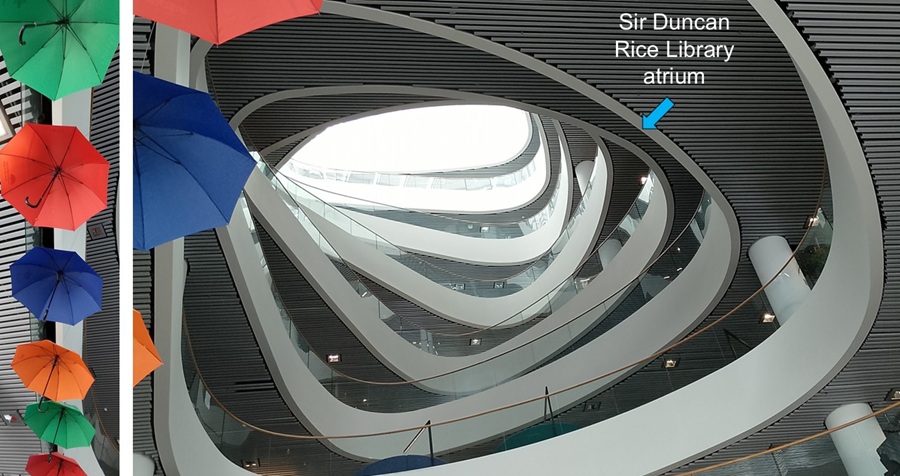
|
|||||||||||||||||||||||||||||||||||||||||||||||||||||||||||||||
|
We followed the trail to more pieces of art.
Evolutionary Loop 571 by Nasser Azam. Six-metre-tall bronze sculpture inspired by the architecture of Sir Duncan Rice Library. The students and staff named the art piece. The artist has meant to call it "Eclectic Grace". Another sculpture outside the library is called Waterlines. It is based on the Aberdeen fast sailing ship Thermopylae launched in 1868. She is considered the fastest sailing ship ever constructed. The shape and lines are also meant to reference Pictish standing stones in Aberdeenshire. |
|||||||||||||||||||||||||||||||||||||||||||||||||||||||||||||||
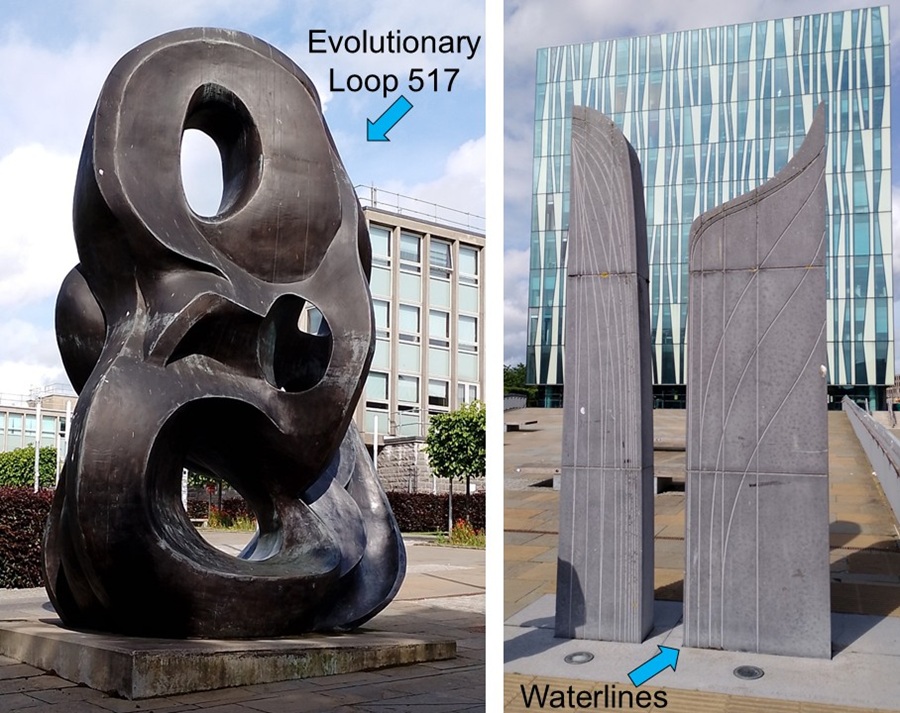
|
|||||||||||||||||||||||||||||||||||||||||||||||||||||||||||||||
| In the Scott Brown Quadrangle we found, Case, a bronze sculpture from 2007 by Yorkshireman Steve Dilworth. We're not sure what inspired him to come up with this. | |||||||||||||||||||||||||||||||||||||||||||||||||||||||||||||||
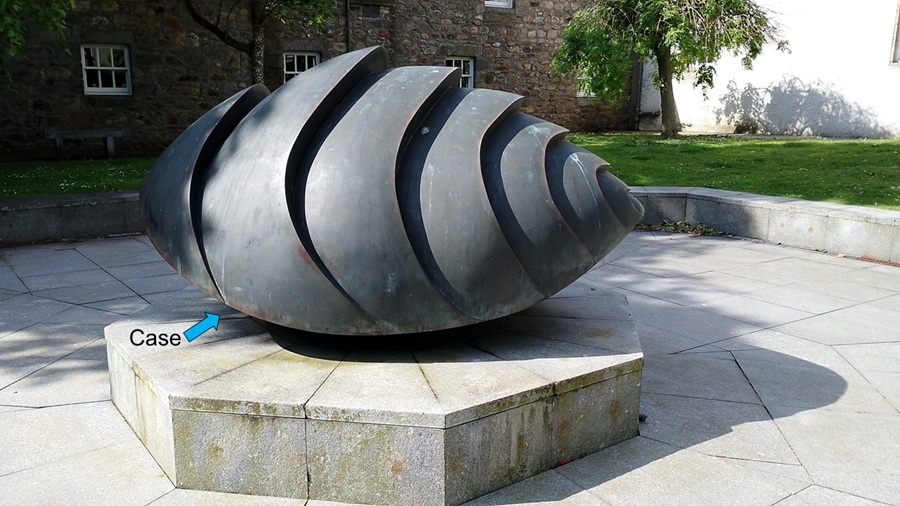
|
|||||||||||||||||||||||||||||||||||||||||||||||||||||||||||||||
| The MacRobert Memorial Garden commemorates Lady MacRobert, widow of Sir Alexander MacRobert Baronet. Their three sons died in 1938 and 1941. | |||||||||||||||||||||||||||||||||||||||||||||||||||||||||||||||
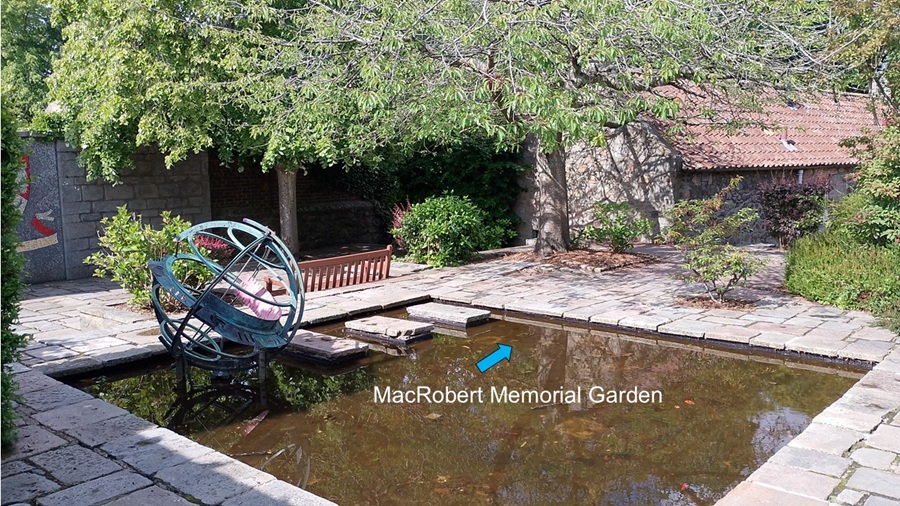
|
|||||||||||||||||||||||||||||||||||||||||||||||||||||||||||||||
| Rob rolled his eyes at the sundial placed in the shade of a large bush! | |||||||||||||||||||||||||||||||||||||||||||||||||||||||||||||||
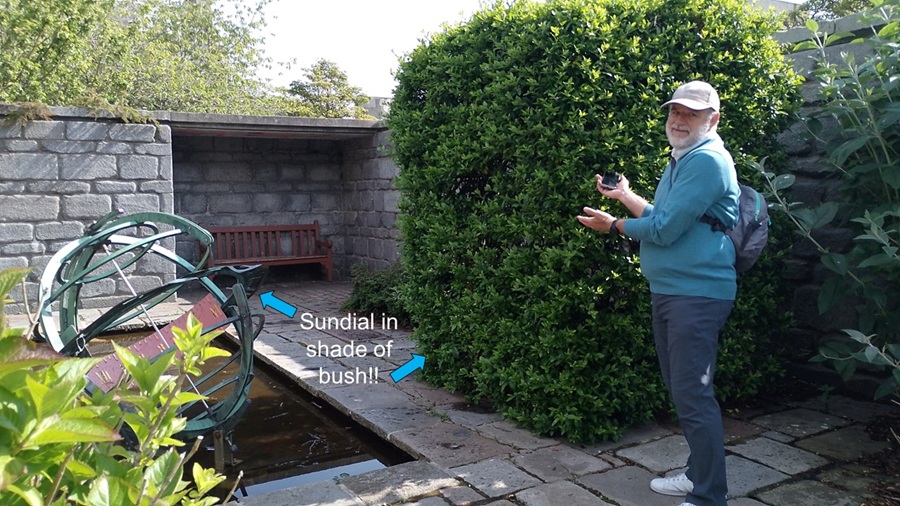
|
|||||||||||||||||||||||||||||||||||||||||||||||||||||||||||||||
|
Mitchell Hospital was built in 1801 for five widows and five unmarried
daughters of the Burgesses of Old Aberdeen. In 1924 the building was
extended and then split into individual cottages.
The photo on the right shows a typical cobble stone street in Old Aberdeen. |
|||||||||||||||||||||||||||||||||||||||||||||||||||||||||||||||
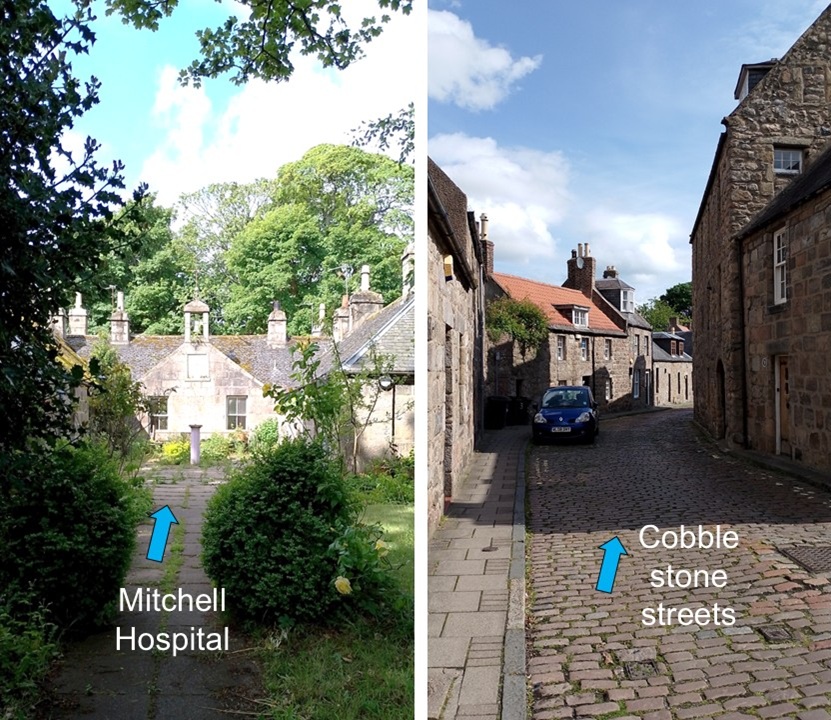
|
|||||||||||||||||||||||||||||||||||||||||||||||||||||||||||||||
| Before heading back to downtown "new Aberdeen" we stopped by St Machar's Cathedral. The church became a cathedral in the 1100s. It has been changed and extended several times since. Many of the treasures were dispersed after the Reformation of 1560. | |||||||||||||||||||||||||||||||||||||||||||||||||||||||||||||||
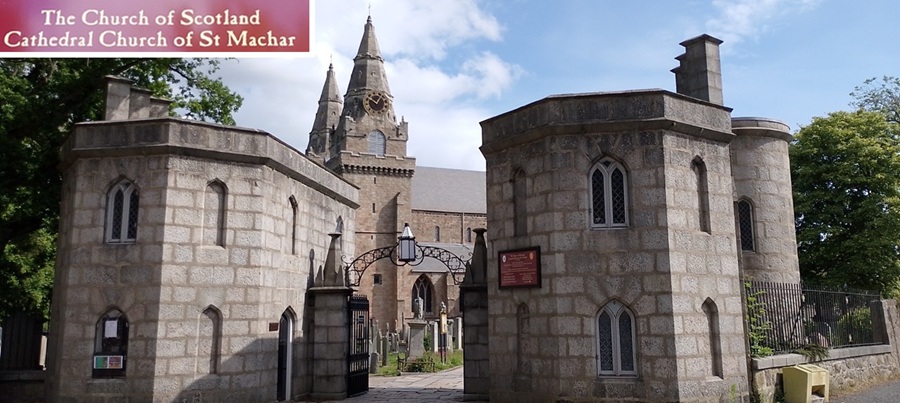
|
|||||||||||||||||||||||||||||||||||||||||||||||||||||||||||||||
| The heraldic ceiling tiles are from 1520. We borrowed a guide to the tiles. We identified the tiles for the Bishop of Orkney and the Bishop of the Isles. | |||||||||||||||||||||||||||||||||||||||||||||||||||||||||||||||
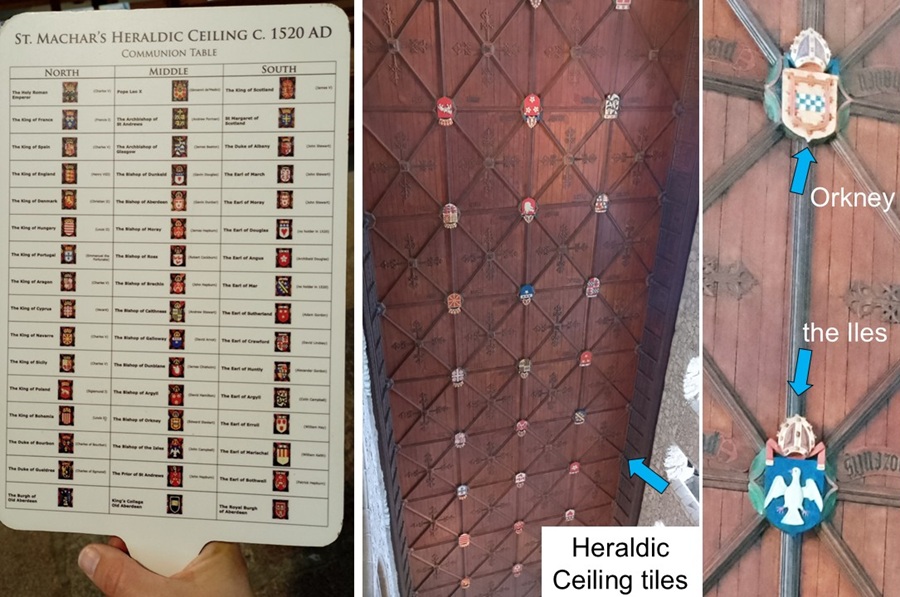
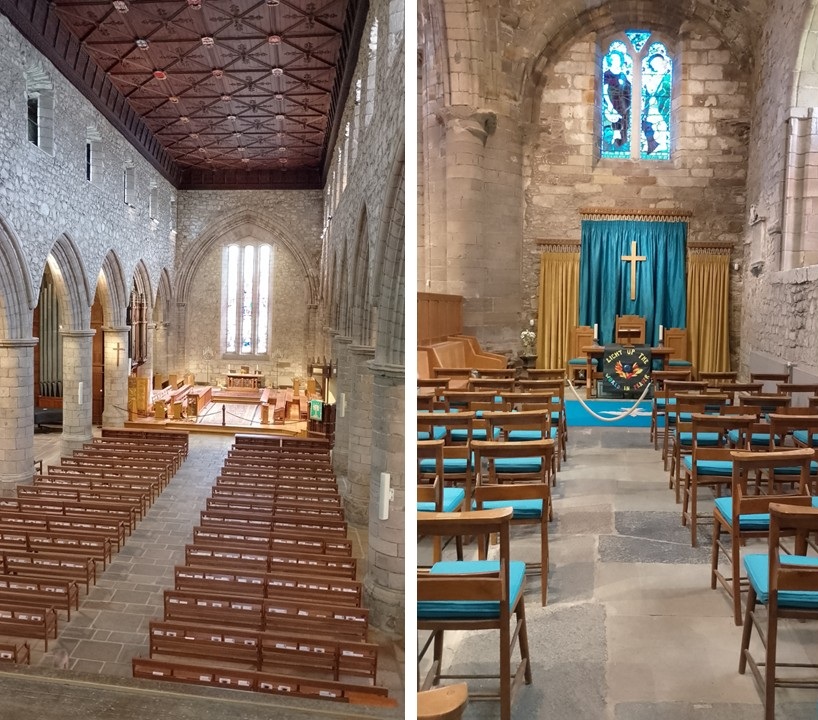
|
|||||||||||||||||||||||||||||||||||||||||||||||||||||||||||||||
| We were getting hungry, so we wandered down to Union Street to investigate the shopping and restaurant side of town. | |||||||||||||||||||||||||||||||||||||||||||||||||||||||||||||||
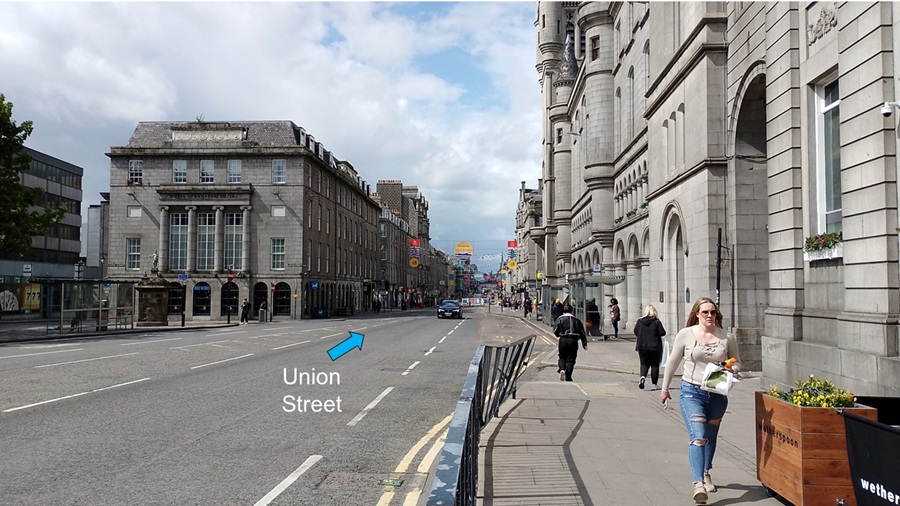
|
|||||||||||||||||||||||||||||||||||||||||||||||||||||||||||||||
| Just like in Edinburgh there are roads up in the air and roads crossing under others. We climbed down stairs on the north side of Union Street, then crossed underneath and climbed back up stairs on the other side. | |||||||||||||||||||||||||||||||||||||||||||||||||||||||||||||||
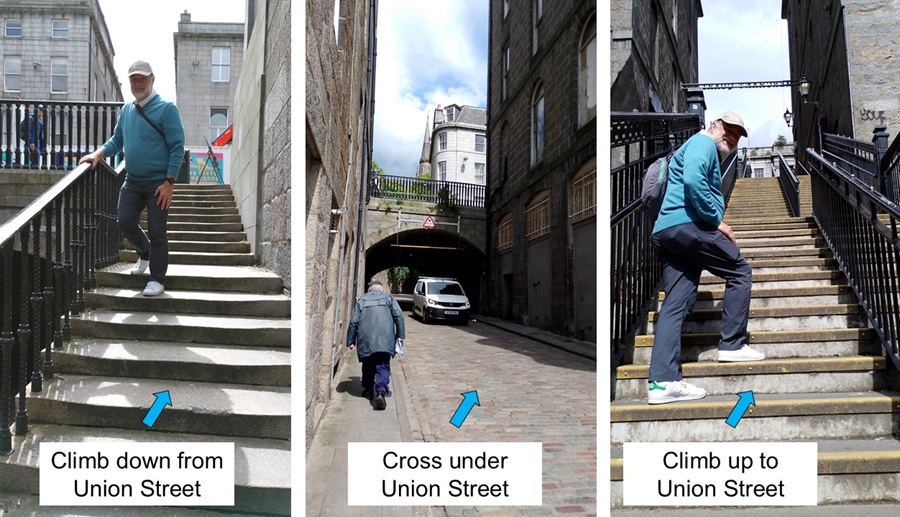
|
|||||||||||||||||||||||||||||||||||||||||||||||||||||||||||||||
| We went to our hotel in Westhill, Aberdeenshire, and got unpacked. Percy gets to rest for a few days. | |||||||||||||||||||||||||||||||||||||||||||||||||||||||||||||||
| Coming up: Westhill, Aberdeenshire | |||||||||||||||||||||||||||||||||||||||||||||||||||||||||||||||
Start
| To Previous Day
| To Next Day
| Nerdy
| Stranger Things
| Stairs Stairs Stairs
May-July 2025
May-July 2025

